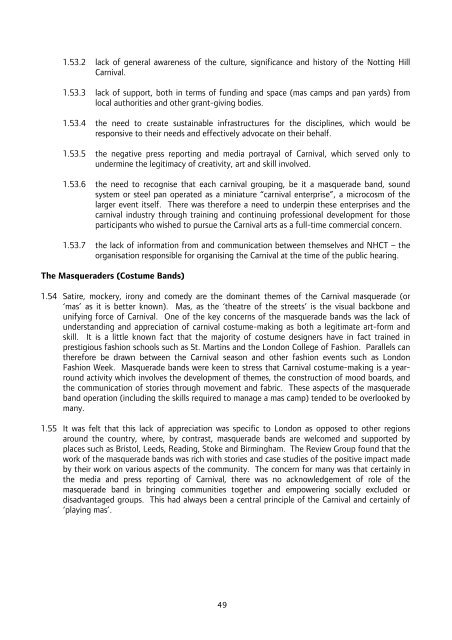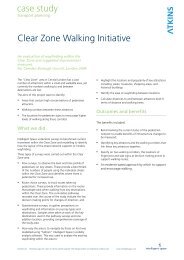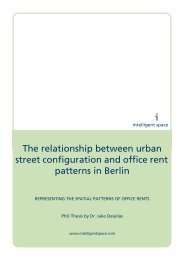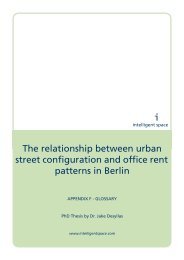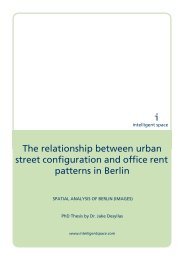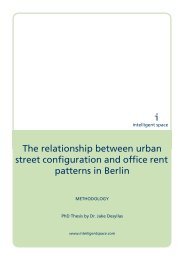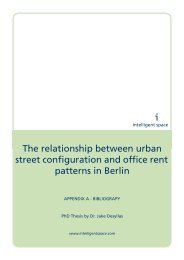Notting Hill Carnival Strategic Review - Intelligent Space
Notting Hill Carnival Strategic Review - Intelligent Space
Notting Hill Carnival Strategic Review - Intelligent Space
Create successful ePaper yourself
Turn your PDF publications into a flip-book with our unique Google optimized e-Paper software.
1.53.2 lack of general awareness of the culture, significance and history of the <strong>Notting</strong> <strong>Hill</strong><br />
<strong>Carnival</strong>.<br />
1.53.3 lack of support, both in terms of funding and space (mas camps and pan yards) from<br />
local authorities and other grant-giving bodies.<br />
1.53.4 the need to create sustainable infrastructures for the disciplines, which would be<br />
responsive to their needs and effectively advocate on their behalf.<br />
1.53.5 the negative press reporting and media portrayal of <strong>Carnival</strong>, which served only to<br />
undermine the legitimacy of creativity, art and skill involved.<br />
1.53.6 the need to recognise that each carnival grouping, be it a masquerade band, sound<br />
system or steel pan operated as a miniature “carnival enterprise”, a microcosm of the<br />
larger event itself. There was therefore a need to underpin these enterprises and the<br />
carnival industry through training and continuing professional development for those<br />
participants who wished to pursue the <strong>Carnival</strong> arts as a full-time commercial concern.<br />
1.53.7 the lack of information from and communication between themselves and NHCT – the<br />
organisation responsible for organising the <strong>Carnival</strong> at the time of the public hearing.<br />
The Masqueraders (Costume Bands)<br />
1.54 Satire, mockery, irony and comedy are the dominant themes of the <strong>Carnival</strong> masquerade (or<br />
‘mas’ as it is better known). Mas, as the ‘theatre of the streets’ is the visual backbone and<br />
unifying force of <strong>Carnival</strong>. One of the key concerns of the masquerade bands was the lack of<br />
understanding and appreciation of carnival costume-making as both a legitimate art-form and<br />
skill. It is a little known fact that the majority of costume designers have in fact trained in<br />
prestigious fashion schools such as St. Martins and the London College of Fashion. Parallels can<br />
therefore be drawn between the <strong>Carnival</strong> season and other fashion events such as London<br />
Fashion Week. Masquerade bands were keen to stress that <strong>Carnival</strong> costume-making is a yearround<br />
activity which involves the development of themes, the construction of mood boards, and<br />
the communication of stories through movement and fabric. These aspects of the masquerade<br />
band operation (including the skills required to manage a mas camp) tended to be overlooked by<br />
many.<br />
1.55 It was felt that this lack of appreciation was specific to London as opposed to other regions<br />
around the country, where, by contrast, masquerade bands are welcomed and supported by<br />
places such as Bristol, Leeds, Reading, Stoke and Birmingham. The <strong>Review</strong> Group found that the<br />
work of the masquerade bands was rich with stories and case studies of the positive impact made<br />
by their work on various aspects of the community. The concern for many was that certainly in<br />
the media and press reporting of <strong>Carnival</strong>, there was no acknowledgement of role of the<br />
masquerade band in bringing communities together and empowering socially excluded or<br />
disadvantaged groups. This had always been a central principle of the <strong>Carnival</strong> and certainly of<br />
‘playing mas’.<br />
49


